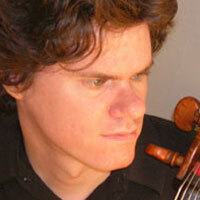
David Russell
Senior Lecturer in Music and Senior Music Performance Faculty in Cello
Hailed as “superb”, “incisive” and “sonorous and panoramic” (Boston Globe), David Russell maintains a vigorous schedule both as soloist and as collaborator in the U.S. and Europe. He was appointed to the teaching faculty of Wellesley College in 2005 and currently serves as Lecturer and Director of Chamber Music. He has served as Principal cello of the orchestras of Odyssey Opera and Opera Boston since 2010 and performs regularly with many ensembles based in New England such as Cantata Singers and Ensemble, the Worcester Chamber Music Society and Emmanuel Music. A strong advocate of new music, Russell has performed and recorded with contemporary ensembles such as Boston Modern Orchestra Project, Firebird Ensemble, Ludovico Ensemble, Callithumpian Consort, Music on the Edge, Dinosaur Annex, Collage, the Fromm Players at Harvard, and entelechron. Recent projects include recordings of cello concertos by Chen Yi and Lukas Foss, recordings of solo and chamber works by Lee Hyla, Eric Moe, Tamar Diesendruck, Donald Crockett, Andrew Rindfleisch and Roger Zahab as well as premieres of music by David Lang, Barbara White, Marti Epstein, Daron Hagen, José-Luis Hurtado, Robert Carl, Gilda Lyons, and Jorge Martin. Russell has also recently premiered works for cello and orchestra by Laurie San Martin and Samuel Nichols, as well as works for solo cello by Tamar Diesendruck, Andrew Rindfleisch, and John Mallia. Russell has recorded for the Tzaddik, Albany, BMOPSound, CRI, Centaur and New World Records labels.
Education
- B.M., Eastman School of Music
- M.M., University of Akron Main Campus
- D.M.A., Stony Brook University
Current and upcoming courses
Advanced Performance Seminar
MUS344
Music 344 offers an exciting opportunity for accomplished performing music students to develop their artistry and performance skills on a high level. Qualified students participate in this weekly performance class in addition to their weekly one-hour lessons (MUS 344-M) with their private instructors, and develop their abilities by performing frequently in class and receiving constructive feedback. Students also grow as musicians by listening to other students perform, by being exposed to the broad range of repertoire presented in class, and by participating in the process of constructive criticism. In conjunction with their in-class performances, students are asked to provide brief, written background information about their repertoire to enhance their understanding of the music and to prepare for writing program notes. Students should plan on a time investment of about 14 hours per week. Students enrolled for the full year, as is strongly encouraged, perform a jury in the Fall and full recital in the Spring. Students who choose Honors in Performance (Honors Program III) must take MUS 344 as part of their MUS 360 and MUS 370 thesis work, the two components counting as 1 unit of credit per semester.
-
Musical Literacies
MUS100
This course is designed to provide an immersion in the world of music to improve listening, reading, and general comprehension skills. The focus is on the fundamentals of music (notation, rhythm, melody, scales, chords, and formal plans) and listening examples will be drawn from a wide variety of genres, styles, and cultural traditions. Individual members of the academic faculty will visit regularly to introduce students to the rich diversity of approaches to the field of music. No prior musical knowledge is expected. Students may choose to take the Music Theory Placement Exam to see if they can exempt MUS 100 and go directly into MUS 200, MUS 201, MUS 202, MUS 122, or MUS 220. A musicianship lab supplements the three class meetings. May be counted toward the major or the minor.